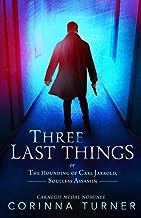Genre
Audience
Author’s Worldview
Catholic
Year Published
2020
Themes
Reviewed by
Carl Jarrold is on death row, and he’s going to be executed tomorrow. Despite murdering several people purely for the money, he doesn’t feel a drop of remorse. He doesn’t believe in God. He doesn’t even believe in love. He’s been visited by priests and preachers for months warning that he will go to hell, but he thinks they just want the social clout of a conversion. What grace could possibly pierce his soul in time? He only has twenty-four hours left. Fr. Jacob says that he of all people needs more time, but Carl doesn’t believe life matters, so his death won’t either, at least so he thinks. But in the last hours of his life the terrifying grace of God starts to work on him as he embarks on a desperate and painful inner journey.
This isn’t a story about miracles. There are no visions or angelic rescues coming for Carl. This short novella is chillingly realistic for a man in Carl’s situation. As disdainful of life as he is, the fear of his imminent death begins to form cracks in his tough exterior, until he is forced to admit that he does want to live. And if there is a hell, he doesn’t want to go there. Though he’s been visited by priests and preachers, they’ve been a mix of Protestant and Catholic. To an unchurched man like Carl, this has left him with a confused and sometimes contradictory education about God.
The story focuses on Carl’s unique constraints, not only of time but education and upbringing. However, I don’t mean to say he is uneducated. As a collage graduate with a degree in Natural Resource Management, he is very intelligent. But he is uneducated in love. Carl himself at one point says, “Is it any wonder that I don’t know God, if I don’t know love?” There are hints of an abusive mother in his past, and an absent father. This isn’t to say that the story excuses him. One of his visitors points out that most people who have abusive parents don’t choose to become hired assassins. The point of the story is to explore what it would take for such a person to choose God at the last minute, after a lifetime of choosing everything else but Him. Only a truly hard-hearted Christian could read this prisoner’s story and not ask what could be done to help reach others like Carl who are woefully short on time and choices.
Because the story is told from Carl’s unchurched perspective, readers of any Christian church will find this a compelling read. The main hero of the story is a Catholic priest whom Carl likes. There is a hellfire and brimstone type Protestant preacher, but Carl describes him in unfavorable terms, so if your Protestant friends or family members have an exceptional aversion to Catholic priests, this might be the only reason they wouldn’t like the book. Also, because of the story’s explicit discussion of Christian concepts of heaven and hell, redemption and judgement, non-Christian readers will probably not be open to this story. If non-Catholic readers do decide to give the book a chance, though, it is short enough that they might very well finish it, creating an opportunity for fruitful conversation. However, the intended audience seems to be Catholics and other Christians.
Although a quick read, Carl’s story will stay in minds and hearts a long time after.



